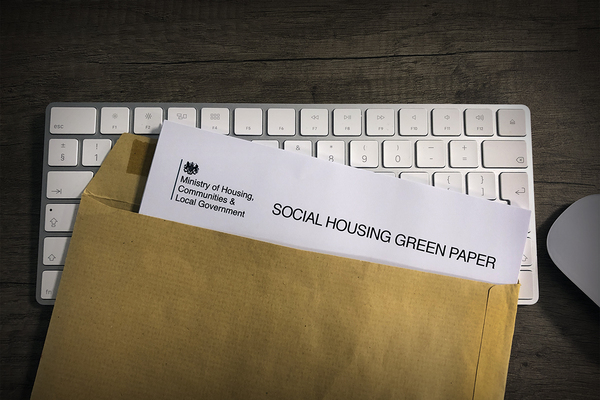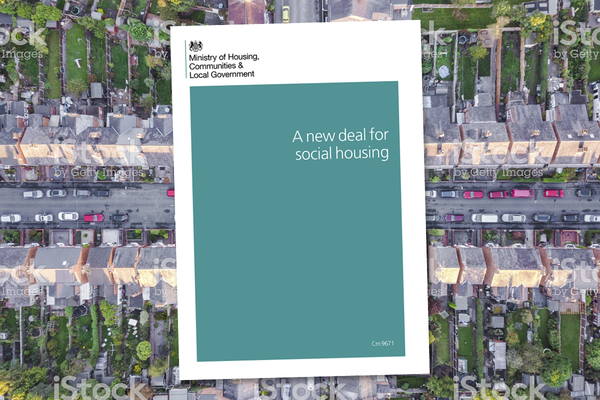You are viewing 1 of your 1 free articles
 Carol Matthews
Carol MatthewsWe can’t just sit back and wait following green paper consultation
Now it’s time to get on with our real response to the Social Housing Green Paper, says Carol Matthews
Many of us have been busy over the past few months thinking how best to respond to the Social Housing Green Paper consultation.
There’s been lots of debate over league tables, consumer ratings and whether and how the social housing regulator should be given back its consumer teeth.
The deadline for submissions has passed.
Now it’s time for us to get on with our real response. Yes, we look forward to seeing what firmer proposals the government comes up with, and we will work individually and as a sector to help develop and implement them. But we shouldn’t just sit back and wait.
The broad direction of travel is clear, and as our annual business planning processes get into full swing, it’s a good time for boards and executive teams to take an honest look at how we are going to do better.
We must ‘own’ any changes.
Here at Riverside we recognise that we need to keep challenging ourselves to provide the quality of homes and services our tenants want. But we are also passionate about our ambition to build more homes, to play our part in addressing the housing crisis.
The government’s recent announcements on increased and longer-term funding have been welcome, but we know they’re nowhere near enough to build the 340,000 new homes that the National Housing Federation and Crisis forecast the country needs each year.
This is particularly pertinent for those of us operating outside overheated markets, and as I’ve said before in these pages, we’re calling for a better one-nation housing deal with our partners in Homes for the North.
The odds seem stacked against us – not only does the government’s standard method for assessing housing need boost housing numbers in the highest demand areas, often to the horror of existing communities, but the recent announcement that 80% of funding across five of Homes England’s flagship programmes will be targeted at areas of acute affordability pressure represents a double whammy – only four out of 72 local authorities in the North are likely to qualify.
The government’s approach of focusing targets and funding on areas where it’s hardest for people to afford a home today may, on the face of it, seem like common sense, but in reality it throws oil on the fire because it fails to rebalance the economy, and provide a housing offer that helps to close the productivity gap.
Whatever happened to the Industrial Strategy? We will continue to work to get the message across that every part of the country has a role in solving the housing crisis.
“Managing the tension between being a good social landlord and an ambitious housing developer goes to the heart of what a modern housing association is.”
So, as we reach the end of 2018, we find ourselves equally preoccupied with the quality of our services and housing supply; indeed, managing the tension between being a good social landlord and an ambitious housing developer goes to the heart of what a modern housing association is.
It’s not something to be embarrassed about, provided that in doing this we are guided by our organisational vision and founding principles.
The types of homes we build, and where we build them, shapes the places we serve and the daily experiences of our residents, whether we retain ownership or sell them on to generate profit to invest in our other homes.
All this is particularly pertinent this year as Riverside celebrates its 90th birthday. Our founders wanted to do something practical about the appalling housing conditions they’d witnessed.
They had a very clear social purpose, but to achieve this they were already thinking commercially.
Their 1928 funding prospectus referred to the need to buy properties at the right price to make the figures work, and proposed turning a property into shops as well as flats, to provide cross-subsidy.
If they were to time travel to today I hope they’d agree that we still have the same social purpose, campaigning zeal and commercial nous that they did back then. But I’d hope they would also recognise, and be proud of, how we are continuing to be proactive in coming up with pragmatic, tangible solutions to improve housing supply and affordability in the 21st century.
Carol Matthews, chief executive, Riverside
Social Housing Green Paper: full coverage
All our Social Housing Green Paper coverage in one place:
Green paper measures are not enough to create May’s ‘new generation’ of council homes Green paper proposals are welcome but much more is needed to support councils to build, writes John Bibby
Green paper shows ministers now see associations as trusted partners Focusing on the failure of the green paper to address supply misses the point, writes Boris Worrall
Government should focus on building on what is already strong Philippa Jones considers the Social Housing Green Paper through a slightly different lens
We need more than a week of delayed announcements bundled together Jules Birch reflects on the government’s ‘Housing Week’ announcements
The regulator should monitor how associations assist homeless people Government announcements this week are positive, but any enhanced role for the English regulator should include looking at homelessness prevention work, argues David Bogle
The regulator’s role should be limited to dealing with systemic failures Julian Ashby suggests the Housing Ombudsman Service should deal with all complaints
The green paper shows ministers are in listening mode Despite some glaring omissions, the government appears to be in listening mode and it is important the sector takes advantage, argues Emma Maier
A short history of social housing league tables Attempts to create league tables for housing associations are nothing new. Mervyn Jones looks at how they have worked in the past
League tables could prove blunt and counter-productive, sector warns Housing figures criticise government proposals to measure social landlords against performance indicators
Government ‘must decide how proactive regulator should be’ on consumer standards Ministers now face a dilemma over the regulator’s focus, sector figures say
The Green Paper: a golden opportunity missed? Melanie Rees assesses the Social Housing Green Paper against recommendations drawn up by the Chartered Institute of Housing and finds the government comes up short
Longer strategic partnerships and guranteed debt to boost social housebuilding The Social Housing Green Paper outlines key ways of boosting supply
The green paper is remarkable progress but it is still not enough The green paper suggests the government appears to be re-writing much of its policy since 2010, but more needs to be done, writes Jules Birch
Green paper marks a ‘milestone’ on resident involvement The government’s recognition residents need clear information is to be welcomed, now it up to the sector to embrace tenant involvement, writes Paul Hackett
Ministers consider stock transfer programme to community-led associations The stock transfer programme could be revived under proposals in the housing green paper
Access to housing grant could be tied to new league tables Grant could be awarded according to how well landlords meet performance indicators, the paper suggests
Ofsted-style regulation of tenant services proposed The government is considering expanding the Regulator for Social Housing’s remit to intervene over tenant services and give it a more “proactive approach to enforcement”
Government proposes dropping one-for-one Right to Buy replacement commitment A consultation paper published alongside the green paper proposes a broader measurement to replace the one-for-one pledge
A list of recent housing policy U-turns The green paper confirms yet more housing policy U-turns from the government, which has spent the past two years dropping policy ideas developed under the David Cameron government. Here is a rundown of the major changes in policy direction
Sector welcomes green paper but calls for more ‘ambitious investment’ Reaction to the proposals, from the National Housing Federation, Chartered Institute of Housing and more
Morning Briefing: reaction to green paper announcements how the media reported the proposals trailed by the government overnight
Government drops plans to force councils to sell higher-value stock The government drops plans to force councils to sell higher value homes
League tables and ‘sharper teeth’ for regulator in social housing green paper Ministers reveal some of the things in the paper ahead of its publication
Grenfell survivors: green paper does not go far enough survivors of the Grenfell Tower fire have said the measures published in the Social Housing Green Paper do not do enough to rectify issues in the social housing sector












